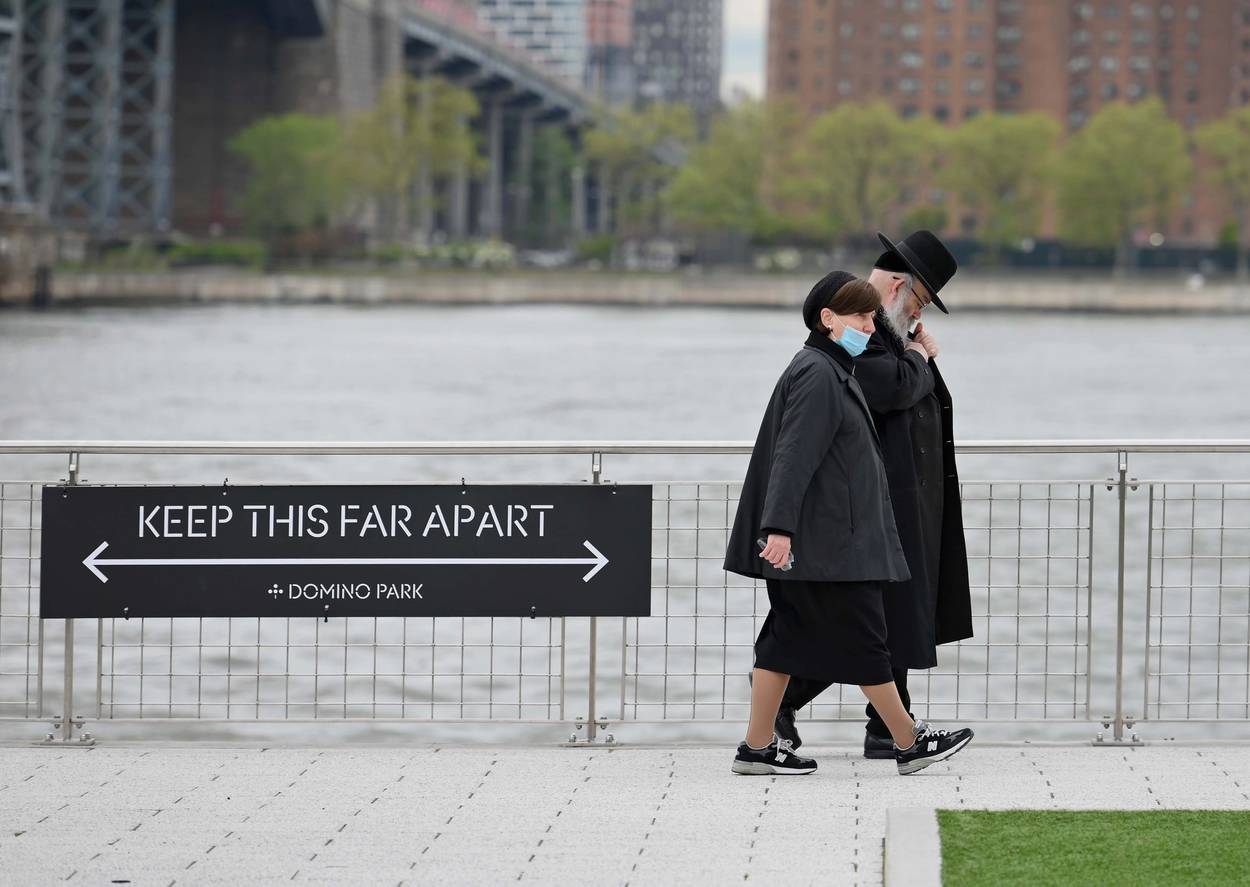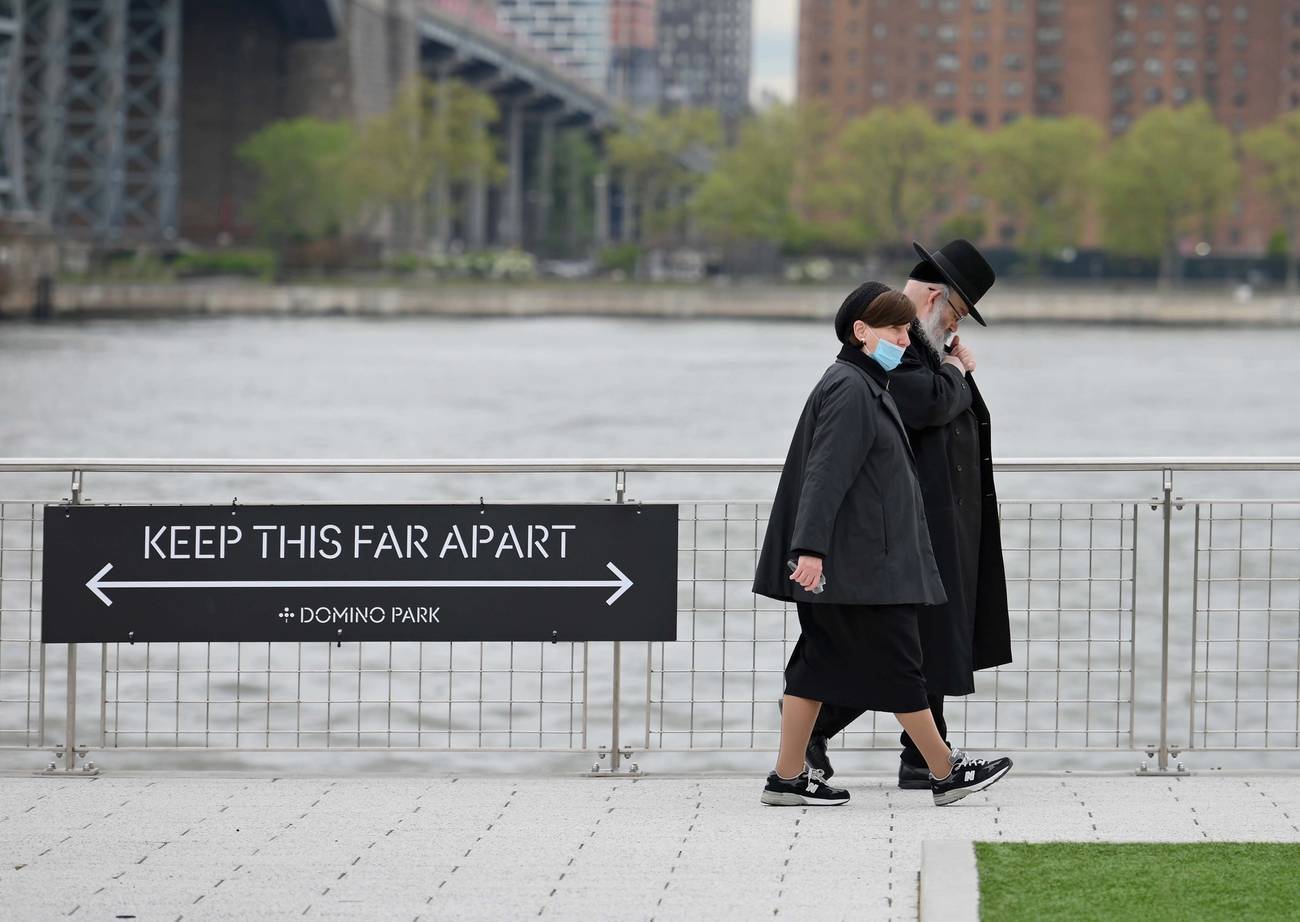Williamsburg’s Jewish Liberated Zone Declares War on Clown Mayor de Blasio
Woke nonsense, bigoted targeting of their community, can’t keep children out of their playgrounds




“Who wants the park to be open?” state Assemblyman Joe Lentol bellowed as scores of tiny hands shot to the sky. On Monday morning the New York City Parks Department had welded shut the entrance to Middleton Playground in southwest Williamsburg, less than 24 hours after an estimated 12,000 people squeezed into the Brooklyn Museum’s plaza for a Black Lives Matter protest. The children of Hasidic Williamsburg, seemingly all of whom own some kind of scooter or small bicycle, were sick of gazing at an empty playground through a locked gate. They wanted to be able to play again.
Lentol stood in front of a high chain-link fence on a shady side street in north Brooklyn late on Monday afternoon. Flanking him were Rabbis David Niederman and Moishe Indig, representing rival halves of the Satmar Hasidic movement, but nevertheless allies against Mayor Bill de Blasio’s using their community as a coronavirus piñata. Someone in city government had wisely decided to remove that morning’s welding, which was quickly taken as a symbol for, and irrefutable proof of, the city’s habit of picking on Jews—an innovation apparently resulting from the coronavirus lockdowns, during which the city’s yearlong rash of physical assaults on Jews has at least declined.
Heavy chains still remained at 5 p.m., providing a wonderfully unsubtle backdrop to the proceedings.
“Kids are locked up for three months. Now that summer is here, they don’t even have a place to play. Is this Egypt? Is this Germany? What message does it send?” thundered Lentol during a short speech before the padlocked gates, evoking some famous examples of anti-Jewish oppression.
In the summer of 2020, people can disagree in good faith as to whether this park, or any city park, was in fact “closed.” Gov. Andrew Cuomo had announced on June 11 that local governments could begin opening playgrounds and other recreation facilities at their discretion. The children and adults assembled at Middleton thought, mistakenly, that while other children in more gentile-adjacent neighborhoods frolicked on swing sets and jungle gyms (all New York City playgrounds were closed), Black Lives Matter protesters amassed in their thousands, and yuppies sunned themselves in Domino Park, Jewish children in Williamsburg—of whom there are thousands—were faced with locked fences across the street from their overcrowded apartments.
There is a basic American concept of fair play that prevails even in places that are thought of as being further outside of the cultural, political, and religious mainstream than they probably are. “We deserve the same as others,” said Rabbi Niederman during the brief rally. “Just open the park, the same as other parks are open,” implored Rabbi Indig. “Williamsburg is not different from any other place ... please do not target our community. Please open our park.”
The gathered crowd of Satmars were here to stand up for themselves, and their leadership was standing with them. Everyone, including Assemblyman Lentol, seemed happy to leave it at the “standing up for ourselves” stage—until a tall, large, loud, and supremely confident newcomer arrived to command the flow of events. Decked out in a white-collared shirt and a press lanyard that he had obviously made himself, he provided evidence of how fluid the rules of life have become in the five boroughs in the form of an imposing pair of red bolt cutters.
Heshy Tischler, the towering Borough Park-based radio talk show host, businessman, former City Council candidate, liberated Middleton Playground on his own initiative, as cops from the 90th Precinct not only looked on with apparent serenity, but also helpfully blocked off a nearby street to traffic so as to protect the growing swarm of delighted children, who were experiencing a sense of happiness and release that only the coldest heart could fail to envy.
“Let our people go!” declared Lentol to the sea of youngsters, the event apparently stoking Mosaic fantasies within the 77-year-old incumbent, who faces a 35-year-old challenger in a June 23 primary, and who could use the electoral boost he’d get from a reversal of Gov. Andrew Cuomo’s recent cancellation of the state’s overnight camps. “Tomorrow we go and we open up the camps!”
Heshy, meanwhile, is in his late 50s and works as a professional expediter for real estate developers and other businessfolk who find themselves in conflict with the city’s multitude of regulators and bureaucrats: “I make things legal,” he told me. “I fight the mayor’s 337,000 employees. Half of them do nothing.”
Kids are locked up for three months. Now that summer is here, they don’t even have a place to play. Is this Egypt? Is this Germany? What message does it send?
Interviewing Heshy proved impossible without his answers escalating into a public speech. “Prospect Park is open because the mayor is over there,” he alleged to me and dozens of other onlookers. “They’re targeting my Jewish community!” he shouted. “He’s right!” replied a woman in a long skirt.
When I caught up with him the next day by phone, Heshy claimed to have personally used a bolt cutter to open 11 playgrounds across the Jewish sections of Williamsburg, Borough Park, and Crown Heights. He is now a local icon of civil disobedience, with these bolt-cuttings popping up on the cover of the Daily News and on Ted Cruz’s Twitter feed and provoking a response from New York City’s dangerously incoherent excuse for a mayor. “We are not going to allow people to take the law into their own hands,” de Blasio said of Heshy’s campaign at a Tuesday press conference, a toothless threat that only underlined how simultaneously pointless and pernicious the mayor’s leadership has gotten.
“Everybody knows my name now—Heshy, Heshy, Heshy,” de Blasio’s new nemesis singsonged. “Hello Heshy, thank you Heshy. Cars are stopping on the street.” But, he cautioned, there was no need to start dreaming of a run for public office. “I‘m not a politician. I’m no one with any clout. I’m just someone who fixes people’s problems.”
In this era of overlapping crises, much of New York’s civic space has been ceded to entrepreneurial attention-grabbers like Heshy. For one afternoon, and with the help of this singular individual, the Satmars became the vanguard of defiance against New York’s increasingly absurd lockdown regime, in which protests are permitted but playgrounds are locked, day camps are allowed but sleep-away camps are canceled, and widespread restrictions on what people can do and how they can go about earning a living endure alongside a creeping sense of low-grade anarchy and social drift.
The Satmars are not exactly the first group one might expect to challenge the status quo in such public fashion, but New York is in the midst of an extended, maybe permanent, gap in the usual order of things—a loosening, downward spiral that augurs ill for the city but is at least better than the recently concluded era of pop-up refrigerated morgue trucks.
Williamsburg is an immensely cohesive and successful community, in part because it is careful not to draw too much attention to itself. In any case, its members all voted for Mayor de Blasio, who was once viewed as friendly on a number of issues, mostly around religious practice and educational autonomy. But the discontent at Middleton was hard to miss, even if it was expressed with the community’s usual caution.
Were the Jews being picked on? I asked Indig. “We don’t know,” said the rabbi. A nearby man, who identified himself as Abe, broke in: “Without a doubt.” Who could deny that de Blasio had it in for the local Jewish community? “He didn’t show up to anybody else’s funeral, but he showed up to the Williamsburg funeral,” Abe noted, in reference to a now-notorious incident on April 28, in which the mayor personally attempted to break up a semi-authorized large crowd in the neighborhood, and then tweeted a “message to the Jewish community” that “the time for warnings has passed.” One needn’t exaggerate about Egypt or Germany-like oppression; the Satmar community’s historical memory stretches all the way back to six weeks ago.
Although it was a Borough Parker who pried open the playground gates, the scene on Monday afternoon resulted from local factors. At the playground, I spoke to a woman who recalled her 14-year-old daughter’s mood swings over the course of a now three-month-long quarantine. For weeks she had been cooped up with six children in a tenement apartment. “Doing nothing brings no good,” was the woman’s verdict on the experience.
In an interview on Wednesday, Rabbi Niederman eschewed the language of organized dissent. “This was a rally and cry out for help, for relief,” he said of Monday’s gathering. “That’s what it is. I don’t know why it’s called ‘protest.’”
Still, Niederman said that the disaffection within the community could no longer be contained. “I think the government sees that the community is unable, and unwilling, to continue to be quarantined, in the sense that our kids have no outlet. Summer schools, day camps, sleep-away camps have to open for the future of our communities to be able to exist. And I hope the government will see that, and will start to act responsibly towards safety precautions, but at the same time also act responsibly towards the mental health and abilities for our families to return to work so that we can put bread on our table ourselves.” Rabbi Niederman cautioned that “we shouldn’t mix politics with emergency situations,” but he would not discuss de Blasio or any other political leader on record.
Indig was less circumspect in talking about New York City’s often baffling chief executive. “I’m not saying he’s an anti-Semite. He’s a friend. He’s not an anti-Semite,” the rabbi said of de Blasio. “We considered him somebody who knew the culture, and who understands the community. I have no idea what’s going on now, and not only us—a lot of people are saying the same.”
The leaders of the Williamsburg Jewish community are often stereotyped as being masters of political transaction who can command an enormous voting bloc in exchange for nearly anything they ask for. In a give-and-take that somehow both vindicates and undermines the idea of democratic self-governance, the Satmars are said to vote for candidates who support, for instance, same-sex marriage, and the progressives they elect and often befriend then dedicate themselves to sustaining the self-governing ethno-religious enclave. But reality is always a little messier. At Middleton, Lentol seemed less like a hostage than like someone who was honestly and righteously furious. “They’re good people,” Lentol told me of his Hasidic constituents, “and they don’t get treated the same way as others as a result of being good.”
While Niederman would not comment on any political leaders on record, he did offer a theory of politics, an ever-shifting playing field in which your friends can both love you and scapegoat you, and where Hasidic rabbis can suddenly become bolder in denouncing the state of things than nearly anyone else in the Jewish community, or really any community in the city. “We commit two sins that everybody commits: That’s democracy,” he explained. The sins, as I understood it, were those of entrusting one’s hopes, dreams, and very existence to worldly leadership, and of then daring to expect anything in return.
“Democracy is that you support somebody who you believe will not interfere with your religious practices—that’s why our country was created,” Niederman explained. “And you want safe streets, and to have your garbage be picked up, and social needs met.”
Armin Rosen is a staff writer for Tablet Magazine.